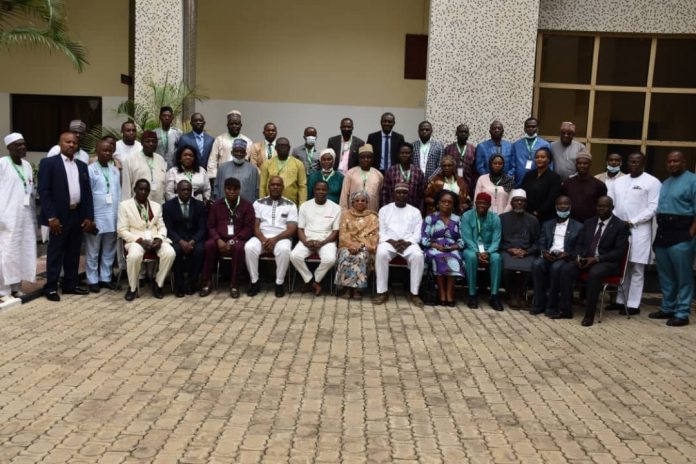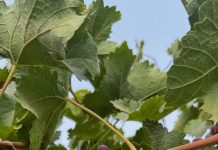The Permanent Secretary, Federal Ministry of Agriculture and Rural Development, Dr. Ernest Umakhihe has stated that the implementation of the National Agricultural Data Management Information System(NADMIS), would strengthen the data Information system for policy, planning and tracking of the Sustainable Development Goals in the Agricultural sector. He said that NADMIS will act as an instrument for the resuscitation and revitalization of data and information services at both the Federal and State Ministries of Agriculture in the country.
The Permanent Secretary ably represented by the Director, Federal Department of Agriculture, Mrs Karima Babaginda, made this known during the opening ceremony of the National Validation of Country Data Set for 3rd Biennial Review Exercise on the Implementation of Comprehensive Africa Agriculture Development Programme, held at Rock View Hotel, Abuja on Wednesday, 7th July 2021, He said preparation has reached an advanced stage for Food and Agriculture Organization(FAO) to facilitate the second phase of the Global Strategy to Improve Agricultural and Rural Statistics in Nigeria.
Dr. Umakhihe informed that ‘’ the Comprehensive Africa Agriculture Development Programme (CAADP), remains the initiative of the African Heads of States launched and adopted in 2003 in Maputo Mozambique, with a commitment to dedicating 10% of the annual national budget and ensuring 6% annual growth in the sector, for enhanced public spending, food security and poverty alleviation in the continent’’.
He stated that an integral part of the CAADP’s implementation process is a continuous sector performance appraisal through the platforms of a national annual Joint Sector Review and a continental Biennial Review. In this regard, Nigeria’s average performances at the inaugural and second biennial review exercises were attributed to the issues of data gaps.
The Permanent Secretary pointed out that ‘’ Nigeria signed the CAADP Compact on 30th October 2009, prepared the first National Agricultural Investment Plan (NAIP I) 2011 – 2014 in December 2010 and established a CAADP Country Team Structure for implementation. Similarly, the 2nd NAIP-2017-2020 was developed and implemented under the sector framework of the Agricultural Promotion Policy’’.
Umakhihe explained that ‘’the Ministry in collaboration with the Central Bank of Nigeria, Commodity Associations and Agricultural Platform Companies launched the Agric for Food and Jobs Programme, a sectoral component of the 2020 Nigeria Economic Sustainability Plan, to support smallholder farmers with inputs for enhanced productivity’’.
He stressed that ‘’ the Federal Government is steadily dedicating huge resources to the development of rural infrastructure, the training of youths to serve as Extension agents, the provision of agricultural machinery to expand the cultivable land area, the implementation of the National Livestock Transformation Plan and the acceleration of fisheries and aquaculture production in the country’’.
He urged the stakeholders at the forum to produce a credible and complete data set that would enable Nigeria to be on track in achieving the Commitments for the implementation of the Comprehensive Africa Agricultural Development Programme.
Umakhihe added that ‘’ we are to use our experience and resource to assess, input and endorse the country’s populated data set in the biennial review reporting template before we submit it to the African Union Commission through the Economic Community for the West African States’’.
In his welcome address, the Director, Planning and Policy Coordination Department in the Ministry, Mr Zubairu Abdullahi, who was represented by the Deputy Director in the Department, Mr. Ibrahim Tanimu said that ‘’ Nigeria had since 2003 been part of the conceptualization, adoption and implementation of the Comprehensive Africa Agriculture Development Programme [CAADP], initiated by the African Union under the New Partnership for Africa Development to increases public spending in agriculture, accelerate sector growth and track the entire process through robust data generation for a continental biennial performance review’’.
He stated that ‘’to make Nigeria achieve a better result, state and non-state actors; synergy is highly required by harnessing all available data in the country. That is, we should focus this validation exercise on the policies, strategies and programmes that had been executed along with research development, value chain, financial inclusion and agribusiness undertakings to diversify the economy, create wealth for Nigerians and foster national development’’.
In his remarks, the CAADP Focal Point Officer in Nigeria, Mr. Mohammed Ibrahim, appealed to the Federal Government to increase the Agricultural sector budgetary provision to meet 10% of the total annual national budget as recommended and adopted by the Africa Head of States in Maputo 2003.
He stated that the Federal Government should allocate more funds in the Sector to address areas of investment that would increase the Agricultural GDP to at least 6%. He further said that stakeholders are expected to support the CAADP team with relevant data based on the indicators for tracking the country’s performance on the implementation of CAADP in Nigeria








